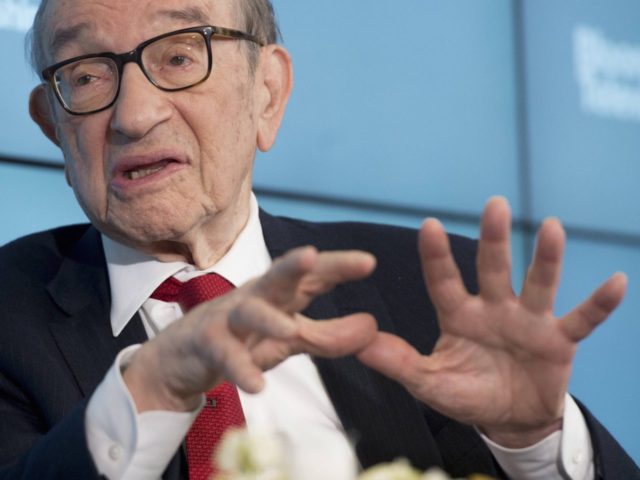Although former Federal Reserve Chairman Alan Greenspan said the UK referendum to leave the EU was a “terrible mistake” that led to a “terrible outcome in all respects,” he now expects “Brexit” will cause an inevitable return to the “gold standard.”
In 1966, Greenspan published “Gold and Economic Freedom” in Ayn Rand’s “Objectivist” libertarian newsletter to praise the virtues of the gold standard:
An almost hysterical antagonism toward the gold standard is one issue which unites statists of all persuasions. They seem to sense — perhaps more clearly and subtly than many consistent defenders of laissez-faire — that gold and economic freedom are inseparable, that the gold standard is an instrument of laissez-faire and that each implies and requires the other.
But after becoming Chairman of the U.S. Federal Reserve in 1987, Greenspan abandoned his commitment to “economic freedom” for statist power. Over the next 19 years, he facilitated the greatest debt-driven asset bubbles in the history of the planet.
Greenspan confesses that in the 1990s when he was “at the table” to develop the 28-nation European Union and the 18-nation euro currency, organizers surreptitiously tried to establish a “political union” under the false pretext they were forming a trade union.
Although Greenspan resigned as Fed Chair in 2006, his successor, Ben Bernanke, worked with the EU’s central bank and Wall Street interests to respond to the 2008 financial crisis by doubling-down on cheap money and government spending.
Greenspan also acknowledges that the EU and the euro were always Ponzi schemes, because they never had a direct national treasury to guarantee their EU northern state transfer subsidies to the southern states. But he believed the EU members would eventually achieve their political union and be able to issue legitimate sovereign debt guarantees.
Joining the EU allowed the United Kingdom to enhance its lucrative financial center dominance to 40 percent of all foreign equity trading, 20 percent of cross-border bank lending, and 43 of the world’s over-the-counter (OTC) derivatives transactions. Consequently, Greenspan couldn’t imagine a nation achieving 2.5 percent long-term GDP growth and 35 percent less youth unemployment than the continent’s average would ever leave the EU.
But after Britain voted for Brexit, Greenspan warns that the burden on the remaining top northern nations of Germany, France and the Dutch to subsidize the southern “toxic liability” of Greece and other “PIIGS” (Portugal, Ireland, Italy, Greece, and Scotland) is about to balloon.
Wearing his former Fed Chairman’s hat, Greenspan cautions that the Brexit means a “debt crisis will be inevitable.” Since he has no faith that political leaders will be able to “restrain entitlement spending” when another crisis breaks out, he “would not be surprised to see the next unexpected move to be on the inflation side.”
Fearing devastating stagflation, Greenspan recommends the world abandon almost a century of monetary manipulation and return to the safety of metal-backed currencies:
“Now if we went back on the gold standard and we adhered to the actual structure of the gold standard as it exists let’s say, prior to 1913, we’d be fine. Remember that the period 1870 to 1913 was one of the most aggressive periods economically that we’ve had in the U.S., and that was a golden period of the gold standard.”

COMMENTS
Please let us know if you're having issues with commenting.